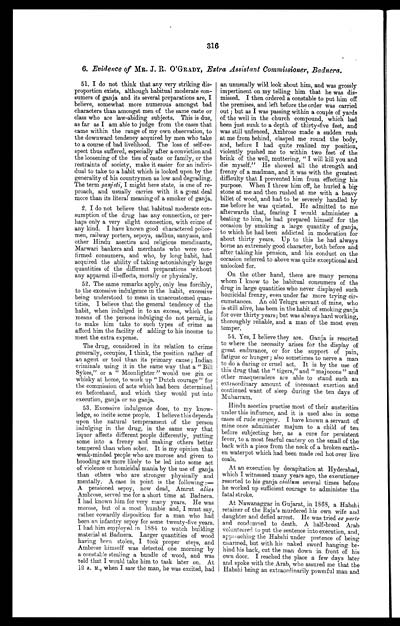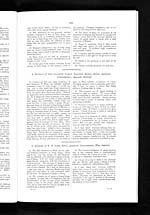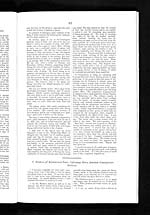Medicine - Drugs > Report of the Indian Hemp Drugs Commission, 1894-1895 > Volume VII > Evidence of Berar witnesses
(334) Page 316
Download files
Individual page:
Thumbnail gallery: Grid view | List view

316
6. Evidence of MR. J. R. O'GRADY, Extra Assistant Commissioner, Badnera.
51. I do not think that any very striking dis-
proportion exists, although habitual moderate con-
sumers of ganja and its several preparations are, I
believe, somewhat more numerous amongst bad
characters than amongst men of the same caste or
class who are law-abiding subjects. This is due,
as far as I am able to judge from the cases that
came within the range of my own observation, to
the downward tendency acquired by men who take
to a course of bad livelihood. The loss of self-re-
spect thus suffered, especially after a conviction and
the loosening of the ties of caste or family, or the
restraints of society, make it easier for an indivi-
dual to take to a habit which is looked upon by the
generality of his countrymen as low and degrading.
The term ganjeti, I might here state, is one of re-
proach, and usually carries with it a great deal
more than its literal meaning of a smoker of ganja.
2. I do not believe that habitual moderate con-
sumption of the drug has any connection, or per-
haps only a very slight connection, with crime of
any kind. I have known good charactered police-
men, railway porters, sepoys, sadhus, sanyasis, and
other Hindu asectics and religious mendicants,
Marwari bankers and merchants who were con-
firmed consumers, and who, by long habit, had
acquired the ability of taking astonishingly large
quantities of the different preparations without
any apparent ill-effects, morally or physically.
52. The same remarks apply, only less forcibly,
to the excessive indulgence in the habit, excessive
being understood to mean in unaccustomed quan-
tities. I believe that the general tendency of the
habit, when indulged in to an excess, which the
means of the persons indulging do not permit, is
to make him take to such types of crime as
afford him the facility of adding to his income to
meet the extra expense.
The drug, considered in its relation to crime
generally, occupies, I think, the position rather of
an agent or tool than its primary cause; Indian
criminals using it in the same way that a " Bill
Sykes," or a " Moonlighter " would use gin or
whisky at home, to work up "Dutch courage" for
the commission of acts which had been determined
on beforehand, and which they would put into
execution, ganja or no ganja.
53. Excessive indulgence does, to my know-
ledge, so incite some people. I believe this depends
upon the natural temperament of the person
indulging in the drug, in the same way that
liquor affects different people differently, putting
some into a frenzy and making others better
tempered than when sober. It is my opinion that
weak-minded people who are morose and given to
brooding are more likely to be led into some act
of violence or homicidal mania by the use of ganja
than others who are stronger physically and
mentally. A case in point is the following: —
A pensioned sepoy, now dead, Amrut alias
Ambrose, served me for a short time at Badnera.
I had known him for very many years. He was
morose, but of a most humble and, I must say,
rather cowardly disposition for a man who had
been an infantry sepoy for some twenty-five years.
I had him employed in 1884 to watch building
material at Badnera. Larger quantities of wood
having been stolen, I took proper steps, and
Ambrose himself was detected one morning by
a constable stealing a bundle of wood, and was
told that I would take him to task later on. At
10 A. M., when I saw the man, he was excited, had
an unusually wild look about him, and was grossly
impertinent on my telling him that he was dis-
missed. I then ordered a constable to put him off
the premises, and left before the order was carried
out; but as I was passing within a couple of yards
of the well in the church compound, which had
been just sunk to a depth of thirty-five feet, and
was still unfenced, Ambrose made a sudden rush
at me from behind, clasped me round the body,
and, before I had quite realized my position,
violently pushed me to within two feet of the
brink of the well, muttering, " I will kill you and
die myself." He showed all the strength and
frenzy of a madman, and it was with the greatest
difficulty that I prevented him from effecting his
purpose. When I threw him off, he hurled a big
stone at me and then rushed at me with a heavy
billet of wood, and had to be severely handled by
me before he was quieted. He admitted to me
afterwards that, fearing I would administer a
beating to him, he had prepared himself for the
occasion by smoking a large quantity of ganja,
to which he had been addicted in moderation for
about thirty years. Up to this he had always
borne an extremely good character, both before and
after taking his pension, and his conduct on the
occasion referred to above was quite exceptional and
unlooked for.
On the other hand, there are many persons
whom I know to be habitual consumers of the
drug in large quantities who never displayed such
homicidal frenzy, even under far more trying cir-
cumstances. An old Telugu servant of mine, who
is. still alive, has been in the habit of smoking ganja
for over thirty years; but was always hard working,
thoroughly reliable, and a man of the most even
temper.
54. Yes, I believe they are. Ganja is resorted
to where the necessity arises for the display of
great endurance, or for the support of pain,
fatigue or hunger; also sometimes to nerve a man
to do a daring or cruel act. It is by the use of
this drug that the " tigers," and " majnoons " and
other masqueraders are able to stand such an
extraordinary amount of incessant exertion and
continued want of sleep during the ten days of
Muharram.
Hindu ascetics practise most of their austerities
under this influence, and it is used also in some
cases of rude surgery. I have known a servant of
mine once administer majum to a child of ten
before subjecting her, as a cure for persistent
fever, to a most fearful cautery on the small of the
back with a piece from the neck of a broken earth-
en waterpot which had been made red hot over live
coals.
At an execution by decapitation at Hyderabad,
which I witnessed many years ago, the executioner
resorted to his ganja chillum several times before
he worked up sufficient courage to administer the
fatal stroke.
At Nawanaggar in Gujarat, in 1868, a Habshi
retainer of the Raja's murdered his own wife and
daughter and defied arrest. He was tried ex parte
and condemned to death. A half-breed Arab
volunteered to put the sentence into execution, and,
approaching the Habshi under pretence of being
unarmed, but with his naked sword hanging be-
hind his back, cut the man down in front of his
own door. I reached the place a few days later
and spoke with the Arab, who assured me that the
Habshi being an extraordinarily powerful man and
Set display mode to: Large image | Zoom image | Transcription
Images and transcriptions on this page, including medium image downloads, may be used under the Creative Commons Attribution 4.0 International Licence unless otherwise stated. ![]()
| India Papers > Medicine - Drugs > Report of the Indian Hemp Drugs Commission, 1894-1895 > Volume VII > Evidence of Berar witnesses > (334) Page 316 |
|---|
| Permanent URL | https://digital.nls.uk/74911594 |
|---|




